Free South Carolina Last Will and Testament Form
A South Carolina last will is an essential and legal document that represents the final wishes of a testator with regard to their private property and in what ways they would want it to get distributed among chosen heirs.
Here, we offer a free downloadable South Carolina last will and testament form and the answers to certain common questions you may have relating to this particular document.
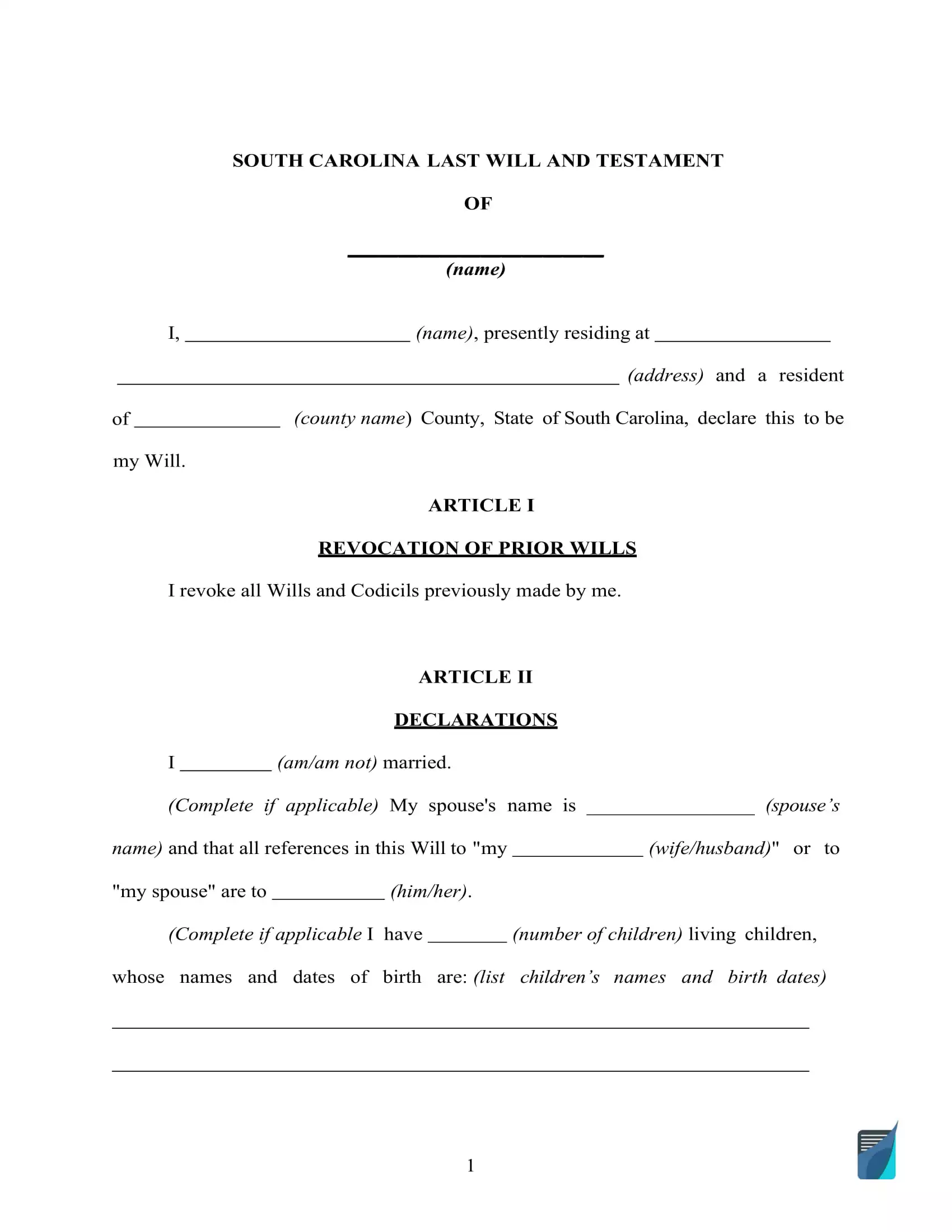
Build Your Document
Answer a few simple questions to make your document in minutes
Save and Print
Save progress and finish on any device, download and print anytime
Sign and Use
Your valid, lawyer-approved document is ready
South Carolina Last Will Laws and Requirements
| Requirements | State laws | |
| Statutes | Title 62 – South Carolina Probate Code; Article 2 – Intestate Succession and Wills | |
| Definitions | Section 62-1-201. Definitions | |
| Signing requirement | Two witnesses | SECTION 62-2-502. Execution |
| Age of testator | 18 or older | SECTION 62-2-501. Who may make a will |
| Age of witnesses | 18 or older | SECTION 62-2-502. Execution |
| Self-proving wills | Allowed | SECTION 62-2-503. Attestation and self-proving |
| Handwritten wills | Might be recognized if witnessed according to the state law | SECTION 62-2-502. Execution |
| Oral wills | Not recognized | |
| Holographic wills | Not recognized | |
How to Write a South Carolina Last Will
1. Consider your possible choices. Make a decision whether you want to hire lawyers or make your last will by yourself (either handwriting it or getting a free last will and testament form).
2. Specify your details. Add your full legal name and address (the city, county, and state of residence) to establish the testator of the will. Check the information you wrote as well as the remainder of the passage, including “Expenses and Taxes.”
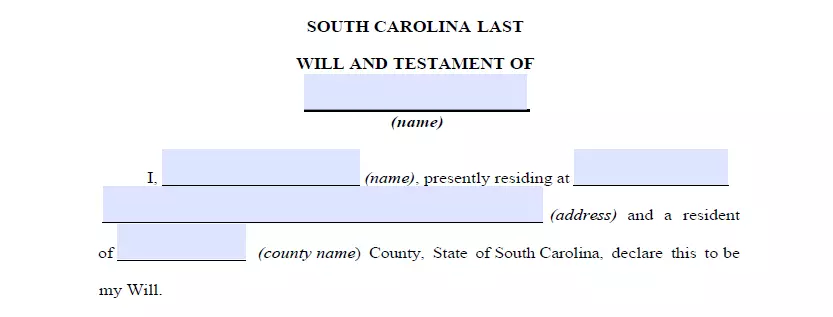
3. Establish the executor. The next step is to select the executor of your last will and testament, the person in charge of making sure that every little thing you lay out in this document comes true. To achieve that, you will need to indicate the executor’s full legal name, along with their residential details (city, county, and state). Be sure to choose somebody who resides in the same state as you do. Otherwise, there’ll be much more red tape and unavoidable hassle identified with the procedure because of different special rules every state has regarding out-of-state executors. Although not obligatory, it’s a wise decision to appoint an additional person to be an executor in the event the first one is unwilling or incapable of carrying out your last will.
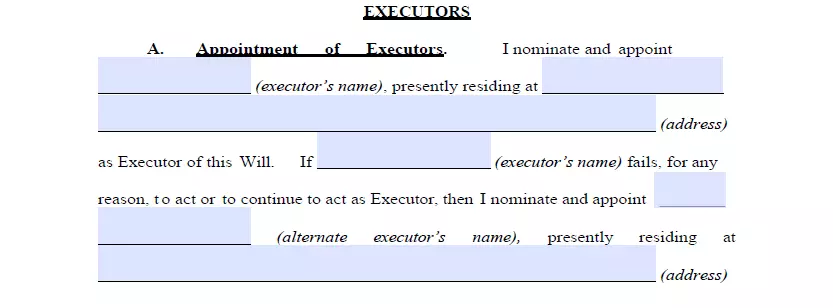
4. Indicate the guardian (optional). You are able to choose a trusted person as a guardian in case you have underage or dependent children that must be taken care of. In case there are no directions regarding who exactly should take care of your kids, the guardian will be assigned by the court.
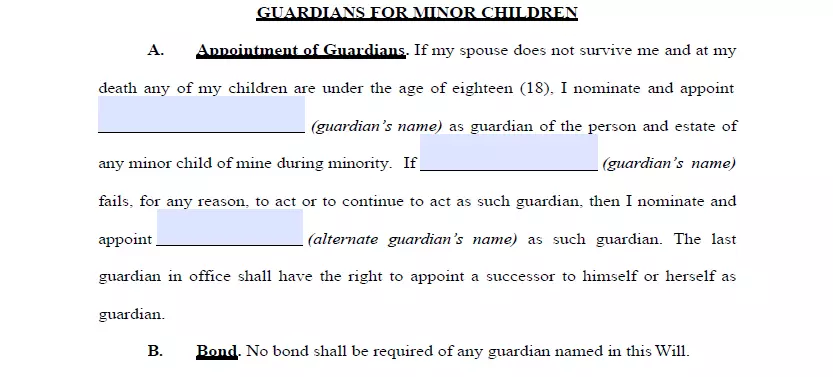
5. Specify your beneficiaries. Now you establish people who will receive your property. For each inheritor, specify the next particulars: full legal name, address, and how they are related to you.
6. Distribute possessions. When you’ve got a property allocation under consideration that is not even, you can explain it within this section. Cash, stocks, realty, company control, money for arrearage, as well as any material things of financial value you possess can be in the last will. But, joint and living will property, along with your life insurance, cannot be put into your last will and testament.
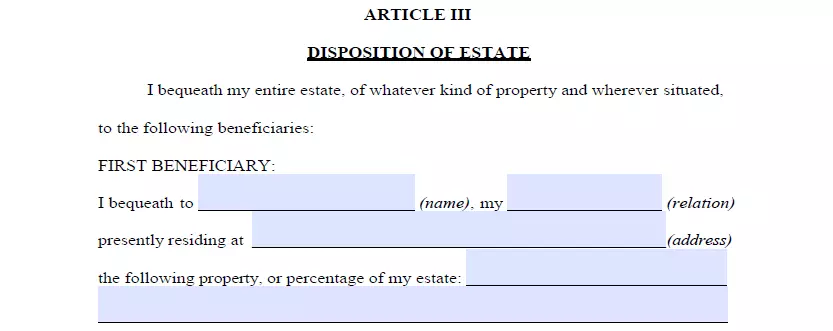
7. Continue with the witnesses signing the document. South Carolina law specifies that no less than two witnesses have to sign a last will for it to be regarded as legally binding. You can appoint somebody as a witness as long as they are over the age of 18 years and are uninvolved in your bequest. Think about picking witnesses younger than you to ensure that they will be around if the will is contested in the court or if any other problem occurs. At this point, you (as well as your two witnesses) have to sign the will after filling out your full legal addresses and names. Do not forget to examine every paragraph thoroughly prior to finalizing the matter.
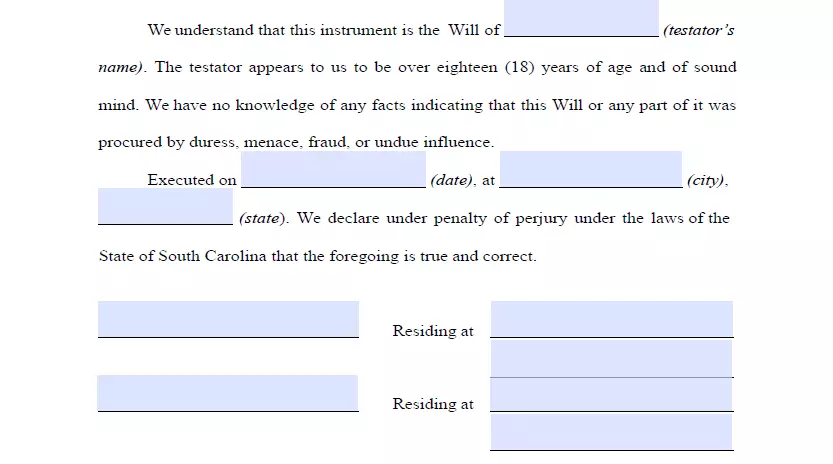
Get a Free South Carolina Last Will Template
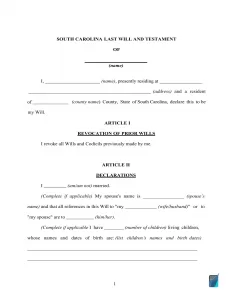

Frequently Asked Questions
Is a South Carolina will form needs a notary certification?
A last will in South Carolina is effective without notarization. However, you will need a notary if you wish to make your will self-proving by attaching an affidavit to it. You may use the form stated in the South Carolina Code (Section 62-2-503) or a similar one to make your last will self-proving. In this case, the court won’t have to contact the witnesses to ascertain the legality of the document, which is going to facilitate the probate.
What exactly does it imply to be testamentary capable?
In order to make your last will and change it (to be testamentary capable), you must fulfill specific requirements with regards to your legal and mental abilities (sound mind) first.
Usually, in most states, to make a last will, you ought to be of sound mind and not less than 18 years of age. “Sound mind” signifies that you don’t have any kind of mental illnesses (dementia, senility, insanity, etc.) that doesn’t allow you to have an understanding of the aftermaths of your actions.
Is child or spouse disinheritance allowed?
In South Carolina, there’s no such concept as community or marital property. It indicates that all of the assets gathered or improved in the marriage do not have to be equally devolved to both marriage partners. In South Carolina, you can easily disinherit your marriage partner; however, your spouse will be entitled to some particular minimum number of your belongings.
As for other family members, it’s possible to legally disinherit anyone else. By adding corresponding disinheritance sections to your last will, you will be able to exclude your adult children or any other members of the family from receiving any of your belongings.
Is it possible to amend my last will without my approval?
No, it is you solely who is permitted to modify your last will and testament. A third party can only sign the last will and testament when you are physically unable to do it.
Can a signed last will be modified in South Carolina?
Yes, it is possible. In South Carolina, if you have not concluded a contract that mentions otherwise (for example, a prenuptial agreement), you can annul or adjust your last will and testament whenever you want. Additionally, it will be a wise decision to update your last will as you undergo a serious life event such as:
- Adoption or birth of a child
- Divorce or marriage
- Real estate or a considerable piece of property has been sold or purchased
- Significant changes in your finances
What will be the consequences of having lost a last will and testament?
South Carolina law indicates that a last will can be accepted if it’s lost or destroyed. However, nothing but the initial version of the last will and testament is likely to be admitted by the probate court.
South Carolina law can give an assumption that the absence of the will means it has been canceled. That places the obligation on the proponent of the will to give proof of the said last will and testament.
The process can get a lot more troublesome when considering a holographic last will and testament. To prove its credibility, the court demands testimony and sword witnesses. In addition, you will have to provide evidence of the actual reason why the will and its elements cannot be produced in ways that will also ensure it wasn’t cancelled.
| Related documents | When to make one |
| Codicil | You wish to make one or a few small changes to your will. |
| Self-proving affidavit | You want to save time and legal fees for your witnesses. |
| Living will | You would like to express your wishes about the end-of-life health care and life-prolonging measures. |
| Living trust | You want to consider an alternative to a last will. |
Last Will and Testament Forms for Other States
